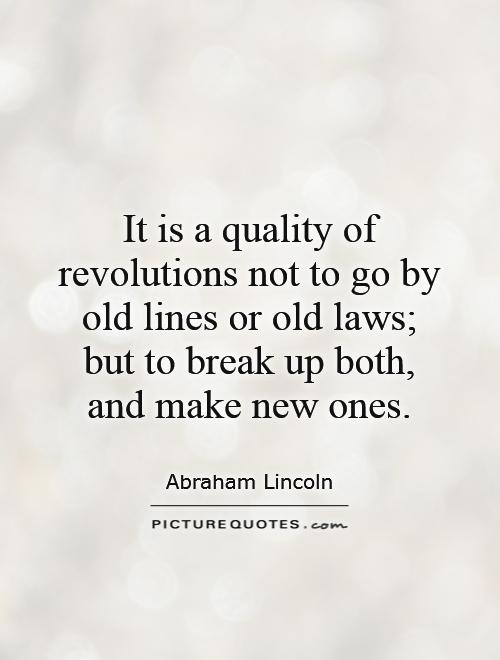It is a quality of revolutions not to go by old lines or old laws; but to break up both, and make new ones

It is a quality of revolutions not to go by old lines or old laws; but to break up both, and make new ones
Abraham Lincoln is often remembered as one of the greatest leaders in American history, particularly for his role in leading the country through the Civil War and ultimately abolishing slavery. His presidency was marked by a series of revolutionary changes that fundamentally altered the course of American history. In many ways, Lincoln embodied the idea that revolutions do not adhere to old lines or laws, but rather break them up and create new ones.Lincoln's election in 1860 was a revolutionary moment in American politics. As the first Republican president, he represented a new political party that was dedicated to opposing the spread of slavery into the western territories. His election sparked a wave of secession by Southern states, leading to the outbreak of the Civil War. In the midst of this conflict, Lincoln faced the daunting task of preserving the Union and ending the institution of slavery.
Throughout the war, Lincoln demonstrated his willingness to break with old laws and traditions in order to achieve his goals. He suspended the writ of habeas corpus, allowing for the arrest and detention of suspected Confederate sympathizers without trial. He also issued the Emancipation Proclamation, declaring that all slaves in Confederate-held territory were to be set free. These actions were controversial at the time, but they were necessary in order to bring about the end of slavery and secure victory for the Union.
After the war, Lincoln continued to push for revolutionary changes in American society. He supported the passage of the Thirteenth Amendment, which formally abolished slavery in the United States. He also advocated for the rights of freed slaves, calling for their full inclusion in American society. In his second inaugural address, Lincoln famously called for "malice toward none, with charity for all," signaling his commitment to reconciliation and healing in the aftermath of the war.












 Friendship Quotes
Friendship Quotes Love Quotes
Love Quotes Life Quotes
Life Quotes Funny Quotes
Funny Quotes Motivational Quotes
Motivational Quotes Inspirational Quotes
Inspirational Quotes